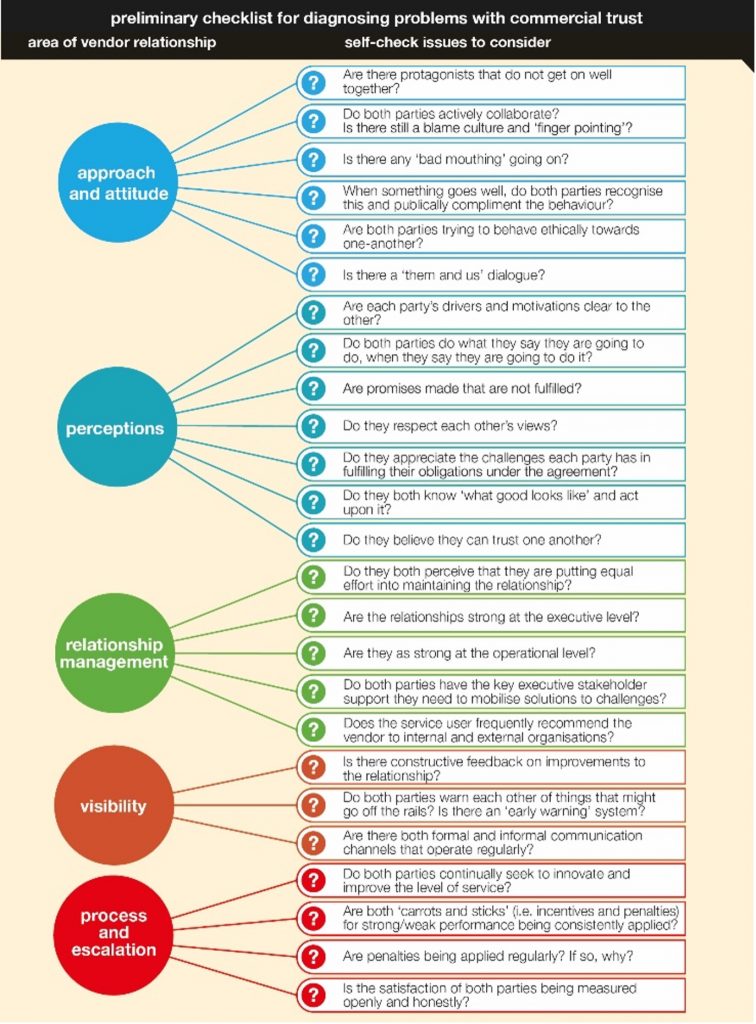 Commercial trust in strategic supplier relationships concerns the way ‘on-the-ground’ behaviours impact the confidence parties have in one another.
Commercial trust in strategic supplier relationships concerns the way ‘on-the-ground’ behaviours impact the confidence parties have in one another.
Essentially, doing what you say you’ll do, when you say you’ll do it, is a positive starting point for relationship building. Trust is an intangible concept, but it can have a very real impact on driving maximum value in your project.
In this article we will look to better define what commercial trust is, identify whether you have it within your strategic relationships, and share a number of tried and tested ways for building (or rebuilding) commercial trust with your supplier partners.
How Do We Know if We Have Commercial Trust in Our Strategic Supplier Relationship?
Our experience, gained from more than 500 strategic relationships, has taught us that building commercial trust is critical to the success of any major complex project. It enables people to address shifting realities in mutually beneficial ways, and in the process to produce significantly better results than power-based relationships do, which rely on rigidly enforcing contracts out of context with the wider strategic goals and business outcomes to be achieved.
Real world economics create a constantly changing environment, making it hard to continue to align the outcomes your organisation is trying to achieve. It is, therefore, also incredibly difficult to keep accurately visualising and undertake an ongoing capture of the specifics you need to address within a long-term supplier relationship at the outset.
This is especially true when new and/or disruptive technologies and innovations to drive better service delivery and improved value for money are at the heart of your efforts. However, try you must, because ambiguity and misunderstanding – both in terms of what’s required of parties and the quantitative targets expected of them – often lead to the degradation of commercial trust, or the loss of it entirely within a strategic supplier/complex project relationship.
Clients involved in complex strategic supplier relationships/projects often assume that suppliers will attempt to classify expectation misunderstandings as ‘chargeable scope creep’. Conversely, suppliers often experience clients trying to classify legitimately different requirements as ‘in scope’, to prevent further charges being levied. This can promote distrust between the parties, preventing the relationship from developing positively.
If you suspect your organisation is operating with low trust towards its strategic supplier, and that the supplier is reciprocating in a similar manner, then undertake a short survey to get a feel (and some basic evidence) for where the relationship currently stands.
What is Commercial Trust in Strategic Supplier Relationships?
Commercial trust concerns the way both sides of a strategic relationship behave, and the way this leads to either more or less confidence in whether ‘the other side’ can be relied upon.
For the ‘battle-scarred’ and experienced contract managers among you, who have been on the wrong side of a relationship with a manipulative partner, the concept of ‘trust’ will be hard to accept. In fact, trust can be an elusive concept, hard won, difficult to measure and all too easy to lose. Then, once lost, it’s so much more difficult to regain than it was to build in the first place.
What is clear is that manipulative behaviour of any kind won’t help either party to drive innovation and get to the real business outcomes you need to achieve, or to maximise value from the project. This means that if you recognise that your partner is acting in an opportunistic way, you need to force yourself to take a step back, particularly if you are more experienced in dealing with relationships of this kind, because the first step should not be blame, but an attempt at realigning behaviours. Building trust works, if it is done correctly.
How to Build Commercial Trust in Strategic Supplier Relationships
Many organisations have successfully implemented trust-based initiatives within their supplier relationships, aligning them with an appropriate balance of power-based contract management.
Our top five evidenced-based aspects to developing commercial trust with your strategic supplier are:
- You need to start from an assumption that most people are good and, therefore, trustworthy. Taking this step will open up a world of possibilities. Starting with a propensity to trust doesn’t mean you should trust everyone. After you’ve done your commercial trust analysis, you may conclude that someone should not be trusted. But if you lead with distrust, you won’t even see the possibilities.
- Prove yourself to be trustworthy, consistently, to encourage others to also want to be trusted. Start by evidencing that you can be relied upon and your strategic partner is more likely to reciprocate with behaviours that evidence their trustworthiness too.
- Commercial trust involves your personal judgement. It’s based on what your instincts and evidence tell you about someone’s motives. Commercial trust is a competency and a process that enables you to operate with high trust in potentially low-trust environments. It helps you to minimise risk and maximise possibilities.
- The clarity and implementation of contract terms can go a long way to build or damage the commercial trust you have with your strategic supplier. Creating or rewriting terms to clarify what’s expected, minimising opportunities for misunderstanding, and the way that you handle formal or informal discussions to deal with issues, all set the tone.
- The creation of a supplier relationship charter – read, agreed and signed by all concerned – to align everyone’s understanding of mutually agreed definitions of social norms within the relationship, such as honesty, authenticity, reciprocity and autonomy, to name but a few, creates a framework within which trust can be fostered.
Unfortunately, some will knowingly or unknowingly look to scupper your efforts: those who create impossibly high standards for trust and those who use the concept of trust to ‘game’ the system and manipulate situations to their own ends, focusing on opportunism rather than collaboration.
It’s important to note, however, that commercial trust is not a substitute for excellence in project management. The two go hand in hand. Commercial trust encourages the right behaviours, so you achieve the maximum value from a well-managed strategic relationship.
Commercial Trust Analysis
Commercial trust is not ‘blind trust’. You need to carry out a reasonable amount of due diligence to ensure your trust is well placed. Your commercial trust analysis should cover three areas:
- Opportunity – What are you trusting someone with? Is it for them to come up with a key strategy? Resolve significant problems? Manage a critical project? Assessing an opportunity is simply a matter of identifying what it is that you’re taking on trust.
- Risk – To trust is to take a risk, but so is to distrust. The objective of commercial trust is to manage risk wisely and to extend that trust in a way that will maximise value in the relationship. To manage this, we need to evaluate the degree of risk involved. This requires us to know the possible outcomes, their likelihood, and their importance and visibility.
- Credibility – This comes down to the character and competence of the people involved. Extending trust is sometimes a leap of faith. In making that leap, it nevertheless pays to exercise due diligence in ascertaining the credibility of the people or organisation involved. If their credibility is low and the risk of extending trust is high, you may decide that it’s smarter not to extend trust. Or you may choose to extend trust cautiously, believing that this will help the person or organisation to increase in trustworthiness, step by step.
If your relationship is plagued with trust issues then you’ll need to ask yourself a number of questions to identify where the sticking points are. The list below spreads the net wide to find the problem you’re experiencing.

Why Does Commercial Trust Matter So Much in Strategic Supplier Relationships?
In our experience, commercial trust powerfully affects an organisation’s reputation, its ability to partner and collaborate with others, its capacity to innovate, its ability to attract, retain and engage great people, and the speed at which it can execute all these aspects of success, plus many more.
Importantly, commercial trust ensures that your supplier is far more inclined to bring its A-game and that you are able to weather storms together without floundering. Essentially, when challenges arise parties in a relationship with strong commercial trust are far more likely to: (a) have an informal ‘cup of coffee/tea’ conversation, or (b) pick up the phone to one another to discuss them openly and honestly, making it far more likely that they’ll get resolved.
Thought leaders who deal with complex strategic supplier relationships/projects now understand that implementing and practising commercial trust is a major ‘currency’ in its own right.
Strong commercial trust between a client and supplier drives confidence in appropriate risk-taking that leads to innovation and progress in innovation-led ventures. When trust rises, the speed of achieving benefits goes up and the costs go down. People can communicate faster, collaborate better, innovate more and do business more quickly and efficiently. The Covey Leadership Centre calls this the ‘high-trust dividend’.
Benefits of Operating Commercial Trust in Strategic Supplier Relationships
Research shows that organisations that adopt a trust-based partnering approach have much more positively-value-driven relationships with their suppliers than do those that choose a power-based approach.
The financial and operational benefits of driving commercial trust across both organisations can be significant and provide compelling evidence for investing significant effort and resources. For example:
-
- A survey in association with the London School of Economics showed that clients in supplier relationships with strong commercial trust incurred up to 40% less cost to reach significantly higher organisational outcomes.
- Gartner Research showed that in major enterprise software partnerships that lacked trust, the client was likely to invest up to double its anticipated spend in the end-to-end costs of operating the service. Despite this additional investment, clients were also likely to fail to achieve their original business outcomes within two years.
- The stress of being a service user in a dysfunctional strategic relationship means that staff turnover in departments that are involved with the service is likely to be 55% higher than in organisations that have strong trust. While staff turnover might not form part of your personal KPIs, the cost to your organisation is likely to run into many millions of pounds.
- Research from the Covey Leadership Centre indicates that organisations that operate with ‘positive intent’ (i.e. commercial trust) towards their strategic partners, have significantly lower costs and higher margins and revenues than do their sector peers.
Want to Learn More?
If you want to learn more about how to build commercial trust with your strategic suppliers, speak to someone at BPG – we’re experts at optimising strategic supplier relationships.
Call us on 0845 345 0130, email advice@bestpracticegroup.com or schedule a confidential chat directly with an expert here.

